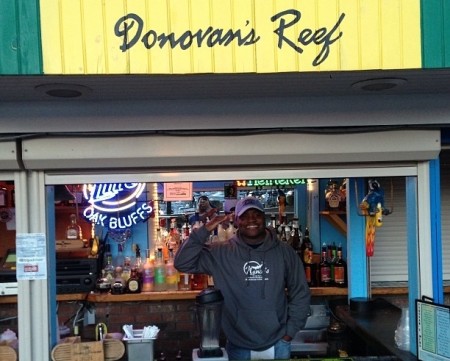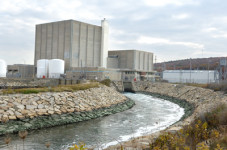CapeCodToday.com – In 1870, at age 30, Captain Baker made his first voyage to the tropics with his newly purchased ship, “Telegraph”. His cargo was mining equipment for Venezuela. On his return, he picked up a cargo of bamboo in Jamaica, where he tasted his first banana. He decided to introduce the exotic fruit to northern markets and he included some bunches in his cargo. However, upon arrival in New York City, the bananas were spoiled and could not be sold. Captain Baker was not deterred. The next year, he returned to Jamaica and loaded his ship with unripe (green) bananas. This time the bananas were just ripe enough when he docked in New York to earn a substantial profit.
Captain Baker spent the next 10 years expanding and developing his fruit importing business which became the foundation of the Boston Fruit Co. and made possible the giant conglomerate United Fruit Company (Chiquita brand) that still exists to this day.
No biggie, just another feather in Cape Cod’s cap. Hey America, enjoying that banana? Well you can thank us for it. Like Cape Cod wasn’t already awesome enough, now we find out we invented the banana.
Is it common knowledge that Chiquita Banana was started by a Wellfleet guy? It seems like this is something that should be taught in Cape schools. We should have statues of Lorenzo Baker everywhere, maybe a few public buildings named after him. This guy should be a Cape legend.
At the very least there should be a plaque at Donovan’s Reef at Nancy’s in Oak Bluffs. Getting a Dirty Banana from Donovan is a rite of passage for Cape Codders, it only seems right to pay homage to the Wellfleet man who made it all possible while enjoying Donovan’s magic elixir. After all, Lorenzo Baker may have first brought the banana to Cape Cod, but Donovan perfected it by adding tons of booze and ice and blending it. The two are forever intertwined.
I think The Real Cape staff might have to take a trip to see Donovan early this summer and discuss the situation over a Dirty Banana or twenty. We’ll donate a nice plaque for him to give the people a little Banana King history lesson while they are in line. Don’t ever say The Real Cape doesn’t do wonderful work in the community. Our goal is to inform every Cape Codder about this new found historical significance of getting hammered on Dirty Banana’s at Donovan’s Reef.
P.S. 93% chance Insane Tony will wake up floating around OB harbor naked on an inner tube with a Ritz tattoo on his forehead.
Facebook: The Real CapeTwitter: Hippie - Insane Tony
More Articles From The Real Cape:








You’re welcome America http://instagram.com/p/kDxnqypiBi/
A little history lesson for ya…
“The first decades of Honduras history were marked by instability in terms of politics and economy. Indeed, the political context gave way to 210 armed conflicts between independence and the rise to power of the Carias government.[7] According to Miguel Cáceres Rivera and Sucelinda Zelaya Carranza, this instability was due in part to the American involvement in the country.[7]
The first company that concluded an agreement with the Honduras government was the Vaccaro Brothers Company (Standard Fruit Company).[7] The Cuyamel Fruit Company then followed the lead. Furthermore, the “””””””””””United Fruit Company””””””””””””” also agreed to a contract with the government, which contract was attained through its subsidies (Tela Rail Road Company and Truxillo Rail Road Company).[7]
There were different avenues that led to the signature of a contract between the Honduras government and the American companies. The most popular avenue would be to obtain a grab on a piece of land in exchange of the completion of railroads in Honduras.[7] It is, thus, the reason why it is a railroad company that conducted the agreement between the United Fruit Company and Honduras.
However, according to Mark Moberg, most banana producers in Central America (including Honduras) “were scourged by Panama disease, a soil-borne fungus (…) that decimated production over large regions”.[8] Therefore, when a plantation would be decimated, the companies would leave the plantation as is, and destroyed the railroads (and other utilities) that they had been using along with the plantation.[8] Therefore, one might argue that the exchange of services between the government and the companies was not always respected.
The ultimate goal in the acquisition of a contract was to control the process from production to distribution of the bananas. Therefore, the companies would finance guerrilla fighters, presidential campaigns and governments.[7] According to Rivera and Carranza, the indirect participation of American companies in the country’s armed conflicts worsened the situation.[7] They argued that the presence of more dangerous and modern weapons gave place to more dangerous warfare amongst the different factions.[7]
In British Honduras (modern-day Belize), the situation was slightly different. According to Mark Moberg, despite the fact that the United Fruit Company was the sole-exporter of bananas in British Honduras, and that the company was also manipulating the government, the country escaped itself from the term “banana republics” that had been coined to other Central American countries at the time.[8] “
[…] shit are we on a roll or what? Not too long ago we found out that Cape Cod invented the banana and now we find out we are responsible for the brown paper bag as well? Is there nothing The Cape […]
[…] money around here. You can bet your ass that every graduate will know that Cape Cod invented the banana and the brown paper bag. They will also leave with everyday skills like how to not do heroin and […]
[…] The Banana […]